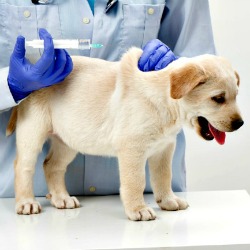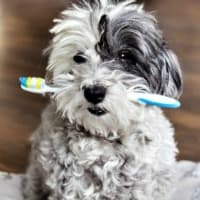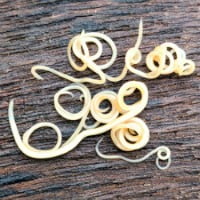Good Puppy Health
Good puppy health doesn't come naturally. It happens when a pup has everything he needs for his body and brain to function at optimal levels.
Some simple things that help keep a puppy healthy include a nutritious diet, a safe home environment and proper veterinary care.
But there are other, less obvious, things which can have a big impact on not only a puppy's health, but his adult well-being and even how long he lives.
The full list could include:
- Healthy (dog) parents
- Nutritious diet
- A strong immune system
- Low levels of stress
- Good dental care
- Minimal chemical/toxin exposure
- Appropriate veterinary care
- The right amount of exercise
- Positive Training
- Proper socialization
- Safe and loving home environment
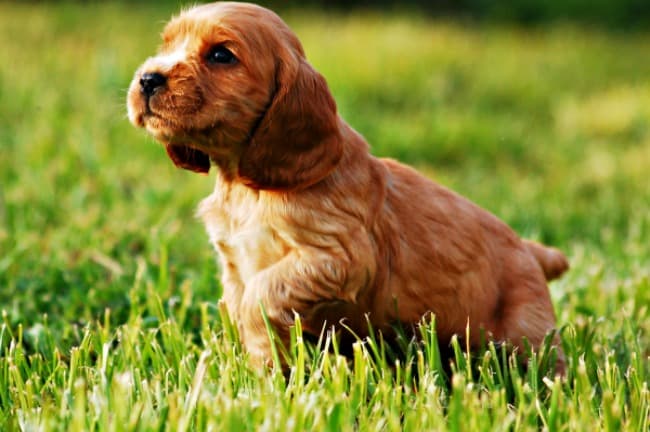
Who's Your Daddy?
Who Rascal's daddy (and momma) are is very important when it comes to how healthy he is, not just as a young puppy, but potentially throughout his lifetime.
The Role Heritage plays in Puppy Health
There are hundreds of dog breeds today, and every single one of them has a predisposition (or weakness) towards developing several different illnesses or conditions.
Also, purebred dogs have been changed physically over generations as the breed has been shaped by the breeder's definition of what 'looks good'... many times what looks good, is not healthy.
Smushed faces, super short legs, bowed legs, droopy eyelids, excessive wrinkling, ears so long they drag on the ground... you know exactly what I mean.
None of these breed traits are healthy and many working dogs today wouldn't be able to do the job they were originally bred for with their current conformation/structure.
If your little Rascal is a purebred puppy it's vital that you learn which health conditions he's most at risk of developing and do whatever you can to prevent that from happening.
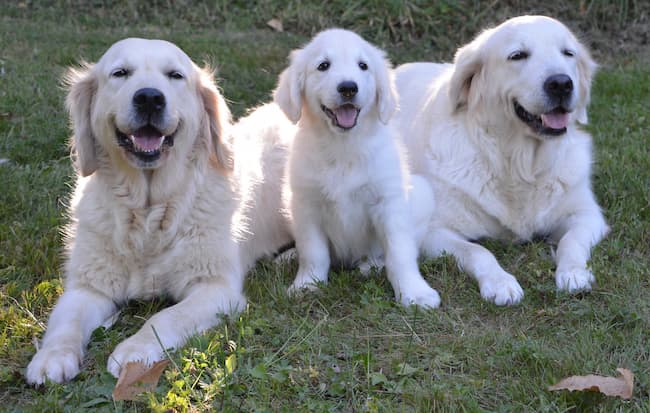
Ethical and responsible breeders test their dogs for genetic conditions and only breed the ones who are not affected.
Unfortunately there are many more unethical dog breeders, and a sickening number of puppy mills and backyard breeders, who care much more about the money they can make than they do about the health of their dogs/puppies.
Mixed breed dogs are generally much healthier overall, but if a puppy is the product of two purebred parents (albeit two different breeds) he could potentially inherit the hereditary weaknesses of either/both his parents.
The Role Diet Plays in Good Puppy Health
The saying 'you are what you eat' is as true for dogs as it is for humans.
If we ate nothing but soda, candy and fast food we wouldn't expect our bodies to be strong and healthy.
If we short-change our dogs nutritionally by feeding a generic food that's mostly fillers and 'junk' and we can't expect their bodies to be strong and healthy either!
For puppies it's even more crucial that their nutritional needs are met because they're growing quickly and are building the foundations of their future size, health and strength.
Making sure little Rascal's body and brain gets the proper fuel is your job because he's depending on you.
Feeding a premium quality natural puppy food, a raw puppy food or a well-balanced, high quality homemade puppy food will ensure your puppy's growing body and brain get the nutrients they need to keep him healthy, and allow him to reach his maximum potential.
If out of the blue your puppy refuses to eat, or his appetite drops away significantly it's important to find out why.
There are some fairly common things which can stop a puppy from eating normally including illness, stress, teething and more.
Puppy Health & The Immune System
Your puppy's immune system is like a defensive army, and its' orders are to protect his body from invaders... whether they're viruses, bacteria, toxins or parasites.
It also works hard to heal his body after injury, and to prevent disease from happening in the first place.
When a puppy is born his own immune system isn't fully developed and he relies on the antibodies and immunity passed on to him when he nurses.
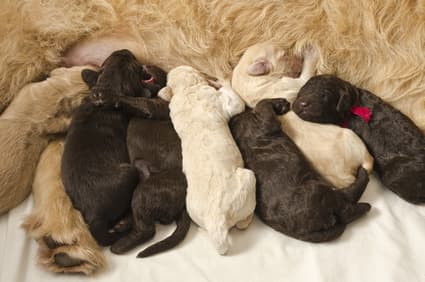
Before her milk comes in (for approximately the first twelve to eighteen hours after delivery) a momma dog produces an antibody-and-nutrient rich liquid called Colostrum.
Colostrum passes vital antibodies onto her puppies, protecting them from any diseases they may come into contact with.
This is called Passive Immunity.
The milk which comes in within a day or two, also contains antibodies which continue to boost immunity.
Puppies who don't get Colostrum, or who don't/can't nurse, are at a huge disadvantage and much more at risk of getting sick.
Passive Immunity & Vaccination
Veterinarians and researchers are not sure how long passive immunity in puppies actually lasts, which is why the currently recommended puppy vaccination schedule requires several vaccinations for each disease over a six to eight week period.
What's the connection?
Passive immunity over-rides vaccine-induced immunity and pretty much cancels it out.
So, if a pups' blood has a high enough level of immunity from his mommas' antibodies, any vaccination he's given will be ineffective.
The current schedule aims at finding the 'sweet spot' where passive immunity is low enough to allow the vaccine to be effective, but before it's low enough for the puppy to be at risk of catching a contagious disease.
But, this results in puppies being vaccinated numerous times, each time they're exposed to the dangerous additives and ingredients in the vaccines.
There is a growing feeling that over-vaccination (which also includes often needless yearly 'booster shots') is causing serious, long-term health problems for our dogs.
Check out my Puppy Shots page for a close look at the Pros and Cons of puppy vaccination and the best, safest way to make sure your pup is protected while minimizing side effects.
Once your puppy's old enough for his own immune system to be working independently, it's important to keep it functioning as efficiently as possible for his own protection.
A nutritious diet, the right vitamins/minerals, stress reduction, enough rest, adequate exercise, the avoidance of damaging chemicals and toxins... all of these things give your puppy's body what it needs to stay strong and healthy.
Stress Negatively Affects Puppy Health
We all know how it goes right?
We have a busy week... not enough sleep, not enough time to eat properly, anxiety over a work deadline or a family crisis... next thing you know we're sick and fair game for every passing virus!
Did you know that happens because stress weakens our immune system, leaving it unable to fight off the next cold/flu or other illness that attacks your body?
Puppy health can be affected by stress in the same way because they're young and their immune systems are fragile. Stress can be emotional or physical, or a combination of the two.
Emotional stress is often caused by big changes in little Rascal's life, such as leaving his momma, traveling long distances to a new home, trying to adjust to new people, places and family members etc.
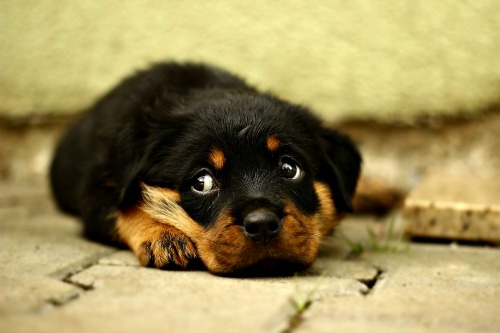
Common causes of physical stress are poor diet and/or parasite infestation.
A stressed puppy can get sick more easily, and two conditions which are common in puppies and strike when the immune system is low are Giardia and Coccidiosis.
The deadly and highly contagious Parvovirus is probably the biggest threat to a puppy, even when he's strong, but even more so if his immune system is weakened.
Two of the most common symptoms of illness in puppies are vomiting and diarrhea.
Diarrhea can also be happen as a direct result of stress alone.
Dental Care & Puppy Health
Ensuring that your puppy's teeth and gums are healthy doesn't just give him fresh smelling breath and shiny white teeth, it also helps to keep his immune system in good shape because gum disease or decayed/broken teeth cause pain and inflammation which affects the whole body.
Of course your little Rascal is just a baby, and his deciduous teeth won't be in his mouth for long enough to decay or have plaque build up on them.
But his adult teeth (most of which he should have by the time he's six months old) need to be properly taken care of so that they last him a lifetime and don't cause health problems down the road.
Luckily, puppy teeth care is pretty simple and setting up a good routine while he's still young is easy.
Learn more here.. About Puppy Teeth
Chemical/Toxin Exposure & Puppy Health
Our world is full of chemicals, toxins and artificial ingredients.
Some are natural, others are man-made. Some can be deadly, most of them are dangerous.
These poisons can enter your puppy's body in a number of different ways... either by ingestion (ie they're eaten or drunk), from contact with the skin or mucus membranes, through injection or by inhalation.
Some will be accidental ie. Rascal chews on a toxic plant, plays on recently treated grass, eats contaminated treats or food, or licks up anti-freeze..., others are deliberate, think topical flea and tick preventatives, vaccination ingredients and so on.
Still others are almost unavoidable in today's busy world, such as cigarette smoke, car exhaust fumes, cleaning products, air fresheners etc.
If you even THINK that your puppy may have ingested something toxic or poisonous, get him veterinary attention immediately as it could be a matter of life or death.
Obviously it's impossible to prevent little Rascal from coming in contact with all of these things, but we can limit his exposure by using natural, chemical-free products for grooming and parasite control such as natural flea prevention and remedies, and by minimizing vaccinations.
We can use natural yard and weed products, avoid smoking in the house/car, puppy-proof our homes and make sure the puppy food and dog treats we buy contain only natural, human-grade ingredients and are made by a trusted (preferably US based) manufacturer.
Puppy and dog toys, treats and food can also be surprising sources of toxins and poisons.
Keep your little Rascal safe by only buying high-quality food and treats from trusted manufacturers (see this page for suggested puppy foods which fit the bill... Natural Puppy Food).
Do the same for puppy toys by choosing toxin-free products, preferably USA made, and with safe, sturdy construction.
You can learn more about toxins found in puppy and dog toys, as well as see a selection of the safest teething toys available on this page... Puppy Teething Toys.
Veterinary Care for Healthy Puppies
When it comes to puppy health, a lot of the first year veterinary visits are pro-active and focused on preventative care.
Prevention is better than cure, and keeping your little Rascal healthy is much preferable to trying to help him recover if he gets sick.
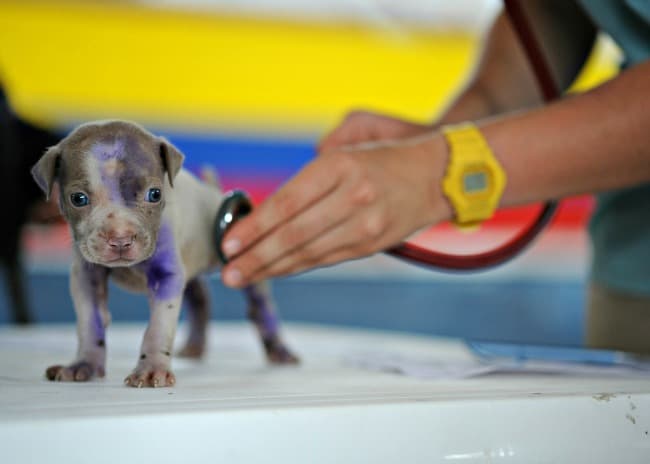
But, it's also important to reduce your puppy's exposure to diseases, and veterinary offices are (of course!) places where sick dogs are most likely to be.
Most veterinarian's have their own preferred protocol for vaccinations and parasite prevention (including puppy worm medicine options for intestinal worms and heartworm prevention) , but you are little Rascal's parent and if you want to do your research, try alternative remedies/treatments for worms or fleas, minimize vaccinations by timing them more accurately and so on, then it's your right to do just that.
Keeping puppy worms from taking up residence inside your puppy is important because an untreated worm infestation can have serious health consequences, and can even be fatal.
When it comes to illness, puppies can get very sick, very fast and it ALWAYS pays to be safe rather than sorry.
If your puppy shows any signs of illness (such as throwing up, diarrhea, refusal to eat or extreme lethargy), or you notice a sudden change in behavior, appetite or activity level, it's vital to have your veterinarian examine him right away.
It could literally mean the difference between life and death for your little Rascal.
You can learn more about the signs and symptoms of illness in puppies, and when to call your veterinarian on this page... Is My Puppy Sick? One of the biggest threats to the health of young puppies is the extremely contagious and dangerous parvovirus. Every puppy owner needs to know about parvo and how to keep their puppy safe.
Spaying or neutering your puppy can help him/her to live longer and help prevent certain diseases and health conditions. However, it's important to get the timing right in terms of when you choose to spay or neuter, as this can minimize any negative consequences of the surgery.
Exercise Appropriately for Puppy Health
How much exercise a puppy needs is kind of like the 'how long is a piece of string?' dilemma.
Every puppy is different in terms of his exercise needs and a lot depends on breed and size... then there's individual personality and energy levels to take into account.
But, one thing is for sure, all puppies need exercise.
You'll probably find that your little Rascal is like a baby/toddler in that his routine will be sleep-eat-play-sleep-play-sleep-eat-play-sleep.... and on and on!
He'll probably play hard for 10 or 20 minutes, then need some down time or a nap to regain his energy.
Young puppies don't need to be 'walked' and it's best to keep them away from streets, parks and any areas where other dogs may have been (to prevent them picking up any diseases).
Short play sessions and simple super-short training sessions are usually enough exercise (mental and physical) for young puppies.
As Rascal gets older and out and about more he can take daily walks (something that is a comfortable distance for both of you).
Don't let him jog, run or jump on hard surfaces such as cement or asphalt (especially if he's a large or giant breed puppy) as this can damage growing joints, bones and ligaments.
The Health Benefits of Puppy Training
We all know that a well-behaved puppy (or dog) is much more fun to be around, and a lot less stressful to own, than one who won't listen or obey a single command.
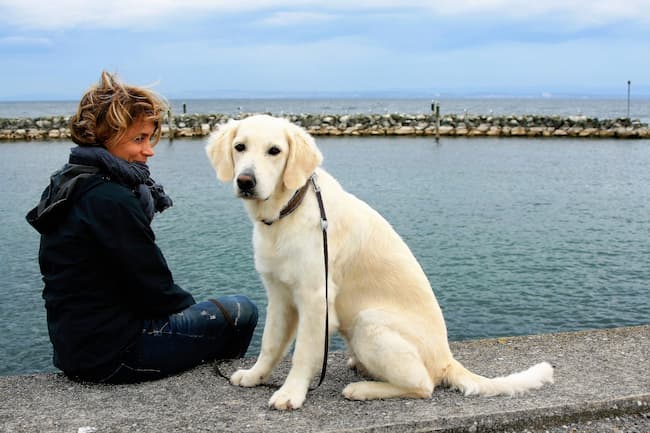
Of course Rascal wasn't born with any human 'manners', and he definitely didn't know a word of human-speak, so training is one of your important and on-going puppy parent responsibilities.
Health isn't just about the body, it's also about the brain, and the right mental stimulation is important too.
Teaching your puppy basic manners and obedience commands doesn't just help him be a more enjoyable family member and a welcome guest, it also helps him stay mentally healthy and can even help prevent anxiety or obsessive-compulsive behaviors.
Puppy Socialization & Health
When it comes to puppy health, socialization is all about mental health.
It's about helping your puppy learn to be comfortable in a variety of different settings and environments.
It's also about teaching Rascal how to behave in social settings and helping him to become familiar with other people, dogs and animals.
A well socialized puppy will grow up to be a happy, friendly, confident adult dog who is comfortable wherever you take him, and with whoever is around him (within reason of course).
Puppies who aren't socialized regularly, or at all, are likely to grow up to be anxious, nervous and skittish when outside of their familiar environment.
They may shake or try to hide, or become snappy or defensive, possibly even in their own home when visitors or strangers come around.
Anxiety like this isn't healthy and can lead to other behavioral problems and a difficult home life.
Socialize early, socialize often, socialize for a lifetime.
Rascal's Happy Home Keeps Him Healthy
At last, we come to the easiest part of puppy health care... making sure that little Rascal's home life is safe, comfortable and full of love.
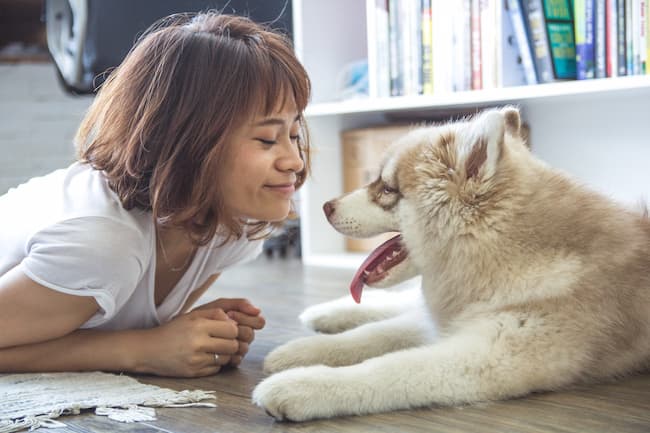
Safety means puppy proofing vigorously, having a securely fenced area for him to play in, using the safest products you can find for pest control, yard maintenance and cleaning, and being careful about the food, toys and treats that you buy for little Rascal.
There are also other, less tangible, things that your puppy needs to keep him happy and content mentally as well as physically.
The most important ones are routine and predictability.
Puppies and dogs are creatures of habit, they thrive when there is routine, orderliness and a predictable schedule.
They're most comfortable and relaxed when the noise level is low to moderate, when emotions are controlled (ie there's not a lot of yelling/shouting/crying or squealing) and when they're shown patience, understanding and love.
Chaos, emotional upheaval and inconsistency in the way they're treated or trained will lead to anxiety and stress - which does not make for a healthy puppy.
You Might Also Like:
- Home
- Puppy Health Care
